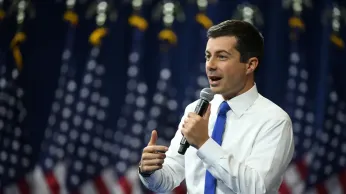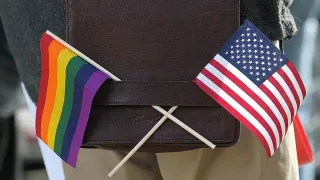
Sep 16
Pete Buttigieg Warns “It’s Not Just Public Figures” at Risk Amid Surge in Political Violence
READ TIME: 4 MIN.
The assassination of conservative activist Charlie Kirk at Utah Valley University last week has sent shockwaves through American politics, reigniting urgent debates about the safety of public figures and the broader threat of political violence to everyday citizens. In the aftermath, former Transportation Secretary Pete Buttigieg appeared on NBC’s Meet the Press to deliver a sobering assessment: “It’s not just visible public figures who have reason to fear from this season, this era of political violence. Every American is endangered when violence replaces politics” . His comments came during a week marked by heightened anxieties over the safety of politicians, activists, and ordinary people alike.
Buttigieg, who served in President Joe Biden’s cabinet until the Trump administration’s return to power, used the platform to call for national unity and a recommitment to democratic norms. He stressed that the foundational American principle—resolving differences through the political process—is under unprecedented strain. “This should not have happened to him, and this should never happen to anyone,” Buttigieg said of Kirk’s killing, extending his condolences to Kirk’s family and noting the human toll of such violence .
“It’s not just visible public figures who have reason to fear from this season, this era of political violence, it’s every American," Buttigieg said during his appearance on the program, "because every American is harmed by this. It’s an attack on an individual and an attack on a country whose entire purpose, entire way of being is that we can resolve what we need to resolve through a political process.”
Buttigieg pointed to a “societal sickness” fueled by toxic online culture and the radicalization of young men in what he described as “dark and twisted corners of the internet” . He lamented how quickly some Americans rushed to assign blame based on the shooter’s perceived political affiliation, warning that such reactions are neither healthy nor productive. “That is not healthy and that is not a way forward,” he said, calling for a collective pause and reflection on the state of the nation’s discourse .
The former secretary’s remarks arrive amid a broader pattern of violence targeting political figures. Kirk’s assassination follows the June killing of a Democratic Minnesota lawmaker and her husband, illustrating a disturbing trend that transcends party lines. Buttigieg’s message is clear: No one is immune, and the risk extends far beyond the headlines.
Buttigieg did not shy away from critiquing the current administration’s response to the crisis. He rebuked President Donald Trump’s vow to pursue not only the shooter but also organizations and critics he accused of fomenting unrest. “We’re not getting the leadership that we need to bring this country together from the White House and in order to turn the tide of political violence," Buttigieg said. "Yes, we have to reject those who commit political violence; yes, we have to reject those who celebrate or promote political violence; but also, in order to deprive political violence of its power, we have to reject anyone who would try to exploit political violence.
"The response to this cannot be for the government to crack down on individuals or groups because of violence, but because they challenge the government politically," Buttigieg summarized.
Buttigieg also offered a candid post mortem of the Democratic Party’s recent electoral struggles, suggesting that President Biden’s decision to seek reelection was a mistake that left the party vulnerable. “He should not have run,” Buttigieg said. “And if he had made that decision sooner, we might have been better off, but it literally was his decision. Nobody else was able to make that decision” . These remarks align with reported criticisms from within the party, including from Vice President Kamala Harris, who has described Biden’s choice as “recklessness” in a forthcoming memoir .
The aftermath of Kirk’s assassination has seen a dangerous escalation in the scapegoating of marginalized groups, particularly transgender people. Right-wing commentators and some Republican officials falsely claimed the shooter had pro-trans messages on his bullets, a narrative that was later debunked by major outlets including The Wall Street Journal . Such misinformation has real-world consequences: queer advocacy groups, including GLAAD, have long identified Kirk as a prolific amplifier of anti-LGBTQ+ rhetoric, particularly targeting transgender youth and gender-affirming care .
Buttigieg’s comments implicitly rebuke this scapegoating, emphasizing that the true threat is not any one community but the erosion of civic norms and the normalization of violence. LGBTQ+ people, and particularly transgender people, remain disproportionately the victims—not the perpetrators—of hate crimes and violence in the United States. Buttigieg’s call for unity and his refusal to engage in divisive blame games stand in stark contrast to the rhetoric emanating from some corners of the political right.
In his closing remarks, Buttigieg urged Americans to focus on building “a different kind of future,” one where political differences are settled through dialogue and democratic processes, not violence . He acknowledged the gravity of the moment but expressed hope that the country could emerge stronger by recommitting to its founding ideals.






